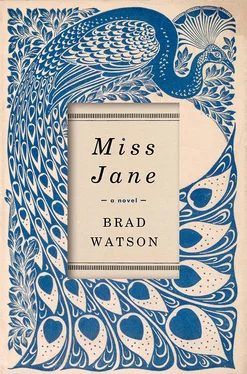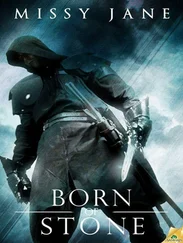“It’s more than I thought it would be,” she said.
“He did increase it a couple of years ago.”
She looked up at Virgil and he was looking back at her.
“How did he afford it?” she said.
“Well,” Virgil said, taking his hat off again and straightening the brim. “Must’ve thought it was better than putting what little he had in some bank to be lost. Increase didn’t really cost that much.”
Jane looked at the check again.
“I guess he figured his time was short,” Virgil said.
When Jane, still looking absently at the check in her hand, did not respond, Virgil let himself out. She was wondering, was this what he thought his life had been worth, or was it simply all he could afford to buy against it? Or had he thought it worth less but, being a businessman, took advantage of the system when he could?
THEY COULD NOT WAIT the days it would take for Sylvester, Jr., and Belmont to travel all the way from Wyoming for the funeral, even had the brothers been able to come. Jane had Dr. Thompson inform them by telegraph that there would be photographs taken, and they could visit when it was most convenient.
They held the funeral service at graveside, there in the plot near their house, instead of the church. Most of the mourners were neighbors and men he’d done business with in cattle. It was an early afternoon. The crops were in, fields turned under. He had apparently at least waited for that. Always a man to finish a job he had already started.
When the words were spoken and the mourners dispersed, she saw a young man at the edge of the little graveyard, standing next to the road. His eyeglasses glinted in the sunlight. She went over. He took off his hat but not his glasses. He was looking at her. She saw the wedding band on his finger. She looked up to see that he noted she had seen it. He was as handsome a young man as he had been a beautiful boy. Hands squared and strong-looking. A nice, mild creasing of fine lines about his blue eyes and closely shaven cheeks, chin stronger than when he was younger, even though he was still just twenty-six years old. His kind nature still evident in his eyes, his expression. Weathered in a way that suggested farming, and when she asked he said yes, he had a place up north of Scooba. The gray wool suit he wore looked just a bit snug on him, as if he’d put on a little weight since buying it but no doubt would wear it as long as the suit and his frame would allow.
“And family?” she said.
“Yes. Two little boys, I’m afraid,” he said with a soft laugh at what that meant to him.
“No more?”
He grinned. “Well, so far. But I kind of think two’s enough, these days. Especially boys. They’re a handful.”
He turned slightly away as if to check the weather. His cheekbones seemed more defined, face matured into a man’s, little trace of the boy’s softness.
“Well,” she said. “It was kind of you to come. Thoughtful.”
He nodded.
“I confess I just wanted to lay eyes on you one more time.”
Her heart turned over. She swallowed.
“Your father was a good man,” he said.
“Yes, he was.”
“Did you know that he came to see me, after they sent you to town?”
“No. I had no idea. Why?”
“He told me that he was sorry about it all. That he knew I was a good boy. ‘Young man ,’ he said. He said I should go on with my life, that you would be all right, he would make sure of it. He said, ‘I take care of my own, son.’ I guess I have to say it was something of a comfort to me then.”
He took her hand in his strong, callused fingers, leaned down and kissed the back of it, like some Old World gentleman. He took off his glasses and slipped them into his coat pocket, as if to let her see him without them again, then put on his hat and walked away down their drive. She heard a vehicle start up out there, then drive away.
Her hand burning where his lips had touched it. Or more like a tingling of the nerve endings that one can’t tell if it’s hot or cold, painful or pleasant. It was a lingering feeling, and then after a while, without her noticing its passing, it was gone.
EVERYONE HAD LEFT by midafternoon the next day.
“Leave me alone just tonight,” her mother said. And after receiving no answer, she said, “I’ll be fine. I would just rather be alone tonight.”
“All right,” Jane said then. “I’ll be back tomorrow.”
And so the doctor drove his own way home, and she and Grace drove back to town, quiet, went to their separate rooms in the house. She stood at the window and looked out over the town, the sparse Sunday auto traffic, the trains coming from the east and the west. The steam from stacks at the power plant, the forge, the Nabs plant, the creosote plant, and the hospital’s laundry. Puffy white clouds drifting low over the hills to the south and making their way along the valley, moving northeast like a patient fleet of ghost dirigibles carrying the equally weightless, invisible souls of the dead. Quiet.
Grace drove her back up the next day. Surprising Jane, she proposed to their mother that she come to live with them in town.
After a long moment Ida Chisolm said, “I don’t want that. I’ve lived in this house since I was seventeen years old. I can’t even hardly remember living anywhere else. It’s just”—she waved a hand as if at a fly—“gone.”
She had indeed lost something. She slept in, a thing she’d never done. Jane milked their milk cow, gathered the eggs, made coffee and breakfast, although her mother would hardly eat. A few bites of greens or peas at supper. She disdained bread. She had taken up smoking a corncob pipe and would sit on the front porch puffing it.
“I’ve got half a mind to see if your father left any of his apple brandy down at his shed,” she said. And she laughed. It was a single sharp, Ha , as if to say, There, what do you think of that? But then she frowned and puffed some more on the pipe.
They endured that first winter alone. Her mother would wrap herself in a heavy coat and blankets to sit on the porch in all weather. As if she couldn’t stand to be inside except to sleep. Dr. Thompson visited them frequently, and would talk to Jane. When Mrs. Chisolm blurted out that she wanted him to give her laudanum, he hesitated, then said he would. After that, Jane’s mother slept in even later, and went to bed immediately after supper, what little she ate.
In the spring Jane went to work in the old garden, planting tomatoes, snap beans, butterbeans, a single row of sweet corn, yellow squash.
Whereas all her life her mother had more often than not been in conflict not only with others but with herself, her own circumstances, angry about one thing or another, mostly dissatisfied and even resentful of her lot in life, now she seemed to have let that go. But in its stead, there appeared to be nothing. As if she had finally fully burned her ability to care about anything in the long-stoked fire of her discontent. And now she was empty.
She did little beyond sit on the front porch, puffing at a corncob pipe and rocking. She spoke little. She made no effort to cook and ate almost nothing. It was difficult for Jane to convince her to wash herself, or even brush her hair. She began to look like those people other people called crazy. Those people who would wander the streets of town or even the rural roads, staring at nothing, acknowledging no one, talking to themselves. Her poor father had seemed to be losing his mind, during the hardest times, and here now her mother was losing hers in some different kind of way, not frightening or even bewildering but sad. If her mother talked to herself, it was a silent conversation. She took no interest in her grandchildren when Sylvester, Jr., and Belmont finally visited, and looked at them as if observing a stranger’s children, the reason for whose purpose in her presence she could not quite divine.
Читать дальше












